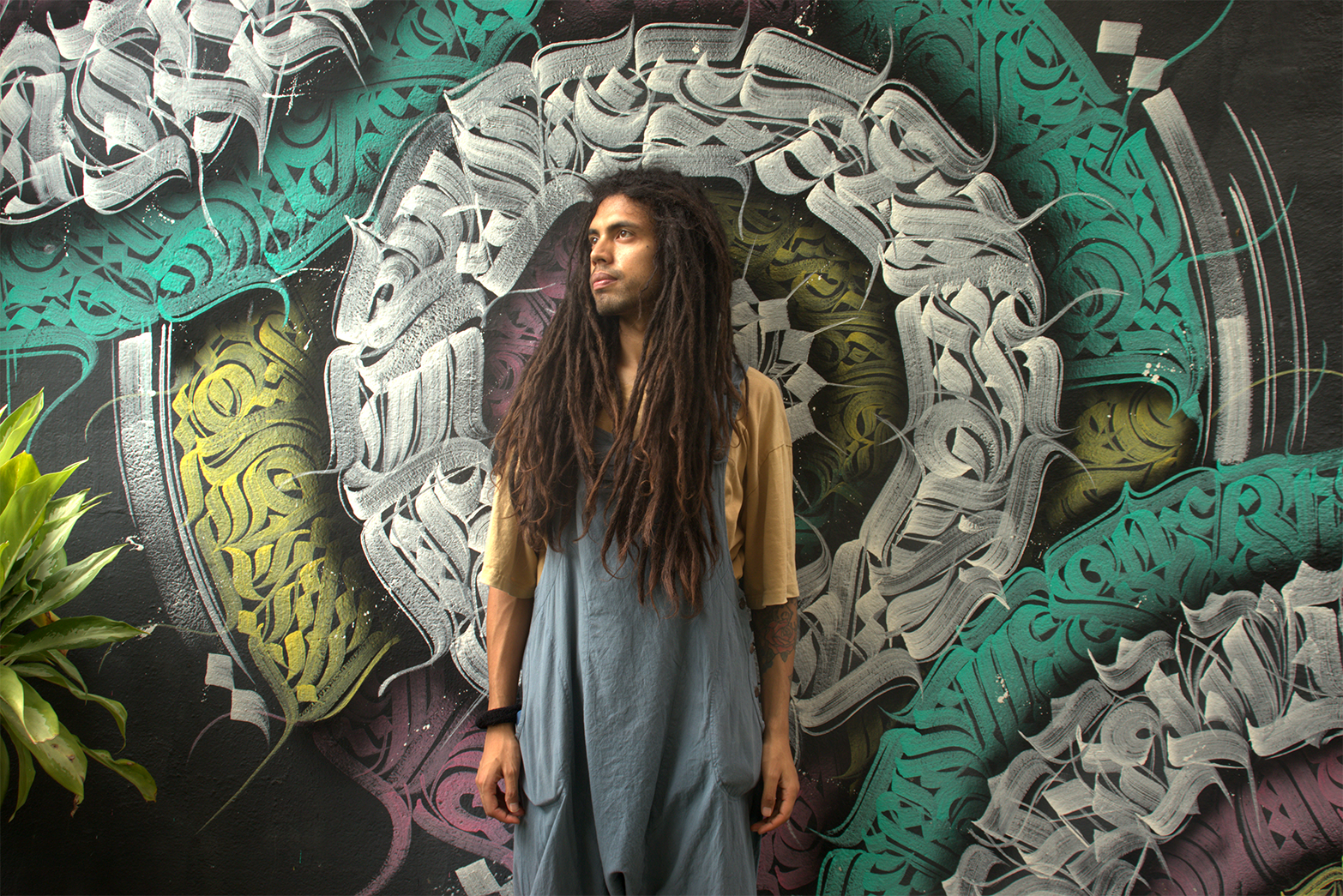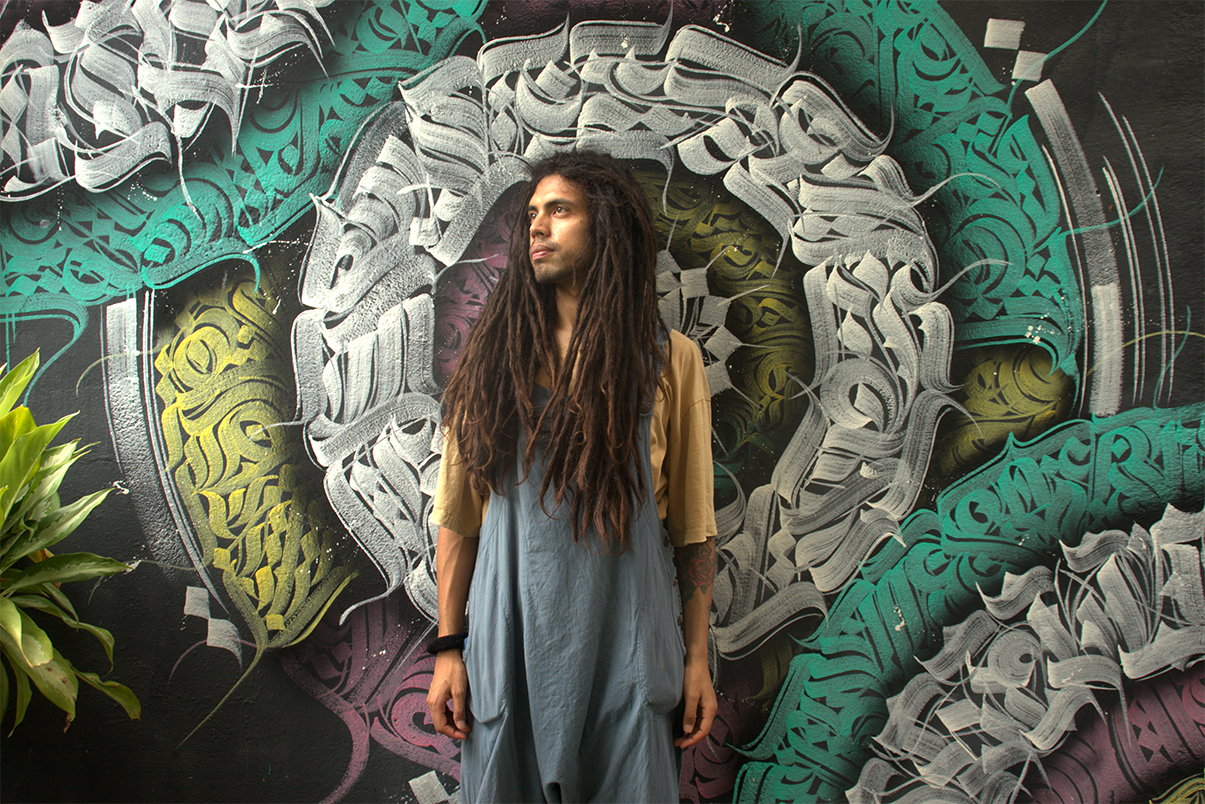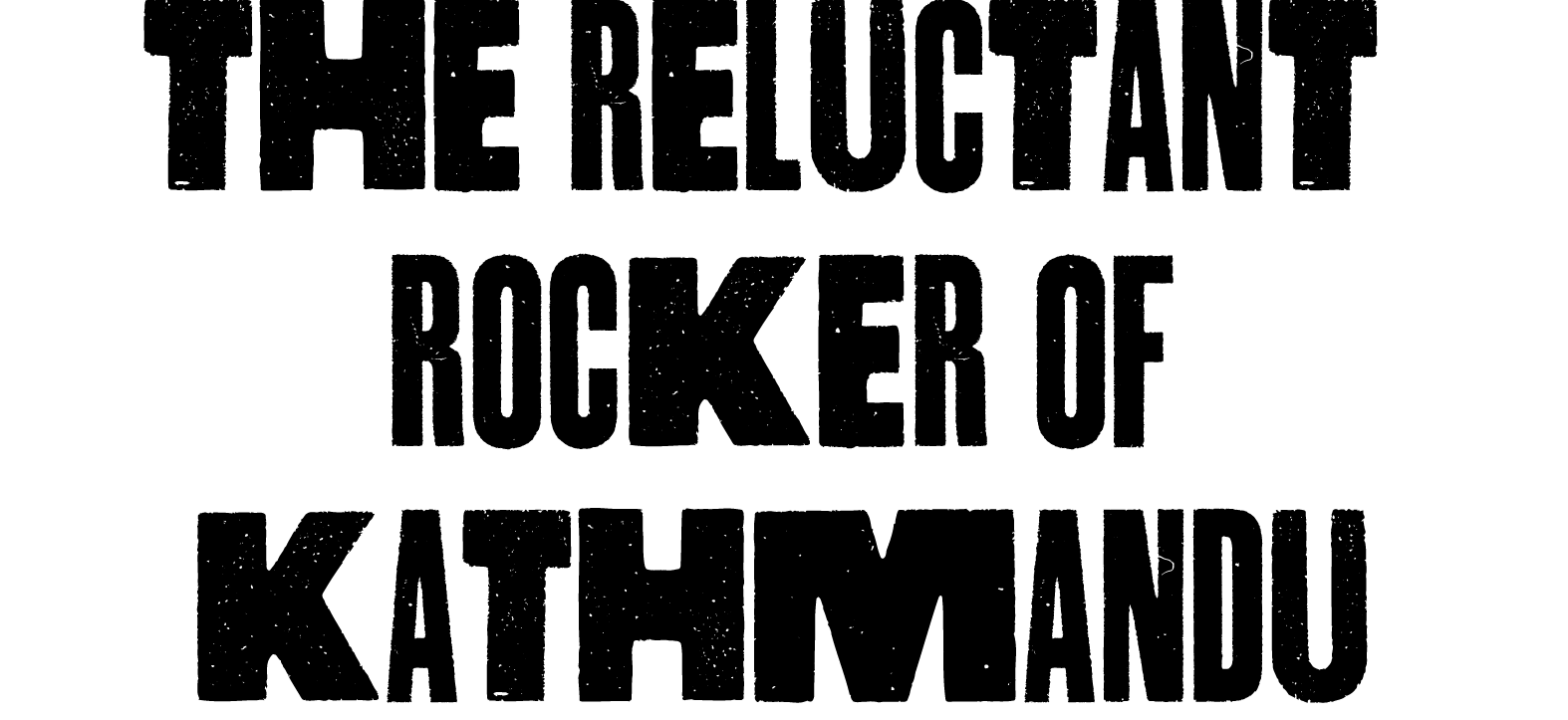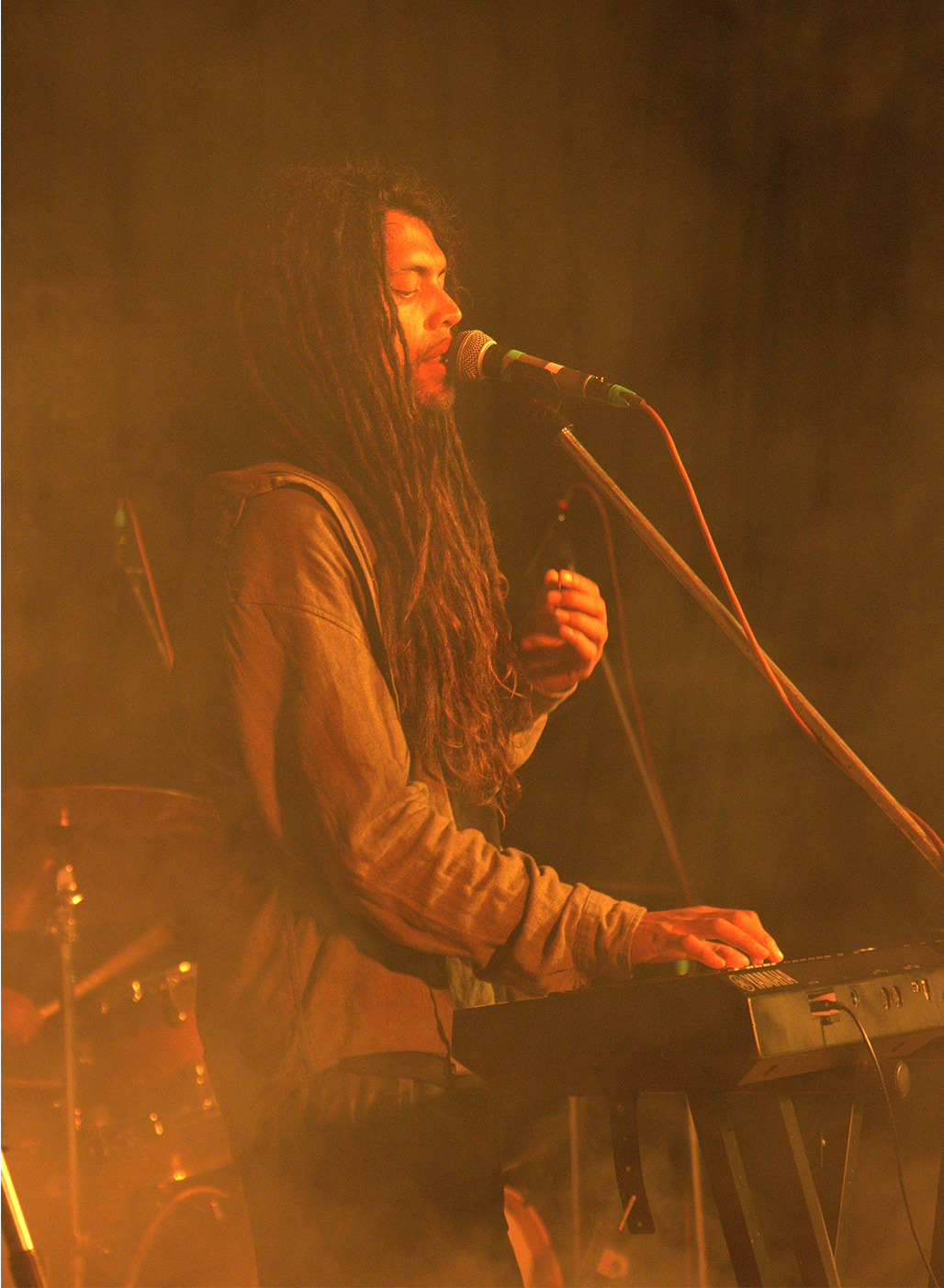




<h1 class="centre">When Rajesh Nepali flickers onto my screen, he looks like a frontman pulled from the afterimage of some half-forgotten rock poster: tattoos scrawled across his arms, dreadlocks falling in long ropes, the silhouette of someone who could swagger beneath stage lights. But he doesn’t. He barely moves. He speaks in low tones, halting, his words hanging in the lag of the Zoom call. At times, he looks away, as if the question has landed in a language he’d rather not use. The quiet is not uncomfortable. It’s something closer to refusal.</h1>
<h1 class="centre">I first found him, like so many strange encounters now, through the labyrinth of Instagram. Not through a stage clip, not even a selfie. A Kathmandu restaurant had posted a blurry photo of him eating silently in the corner. The caption was devotional—how honoured they were to have him there. Digging deeper into his profile, I found grainy studio videos: Rajesh barefoot, headphones clamped, crooning into a battered mic. His voice lurches between classical choir favourites and a rock howl. It’s not the slow indie tonality or the aggressive Tamil rap that’s swallowing the Indian music scene, but melodic soft rock ballads—like the lovechild of Hozier’s gospel drag and Florence and the Machine’s tectonic croons. Essentially, a voice you would not come across every day. While he’s not the next big pop star on the rise, Rajesh’s contentment stems from simply making music, satisfied to remain in the shadows rather than pursuing the grand musical ambition of dominating stages, crowd surfing— the rockstar treatment, et al. His vibrato remains powerful and steady for a small café crowd as it would for a packed amphitheatre.</h1>
<h1 class="left">Chandana, his make-shift manager—or something like it, occasionally chimes in like a faceless voice in the background, encouraging him to elaborate on his journey. “Manager” feels wrong—she is really a researcher, but she stumbled on his music and decided to carry it like a cause. She coaxes him gently when he falls silent, whispering titles from offscreen: “Tell her about that song.” Sometimes he obeys, more often he doesn’t. Watching this exchange between them feels like peering into the mechanics of an artist who never rehearsed the performance of being a musician, only the act of making music.</h1>
<h1 class="left">When he does answer, he cuts things down to the bone. I ask about his 15 years in music—an expanse of time that could be spun into mythology. He shrugs. “Not much.” The words are stripped of any desire to embellish. It’s somewhat like watching your friend fall in love with a man and questioning what she found attractive.</h1>
<h1 class="left">Rajesh’s beginnings sound almost like a parable. A Protestant household in Nepal, nights carved open by gospel hymns. His mother (who was also a devout fan of Rajesh Khanna) sang in the church choir, and Rajesh grew up with his ears trained on faith’s repetitions. He learned drums first, then piano, then guitar. Singing only came after a childhood friend forced him into a radio competition. “He kind of forced me,” he says. “And then I sang—and people liked it.” Even now, he tells it like it was nothing, just a stumble forward.</h1>

<h1 class="centre">But the catalogue of influences he carries is a messier altar: Zeppelin’s dirges, AC/DC’s crunch, the spectral falsetto of Jeff Buckley. He tuned his voice against the crystalline highs of women’s choirs from Nepal’s western hills, voices pitched almost unbearably sharp. “I used to listen to female gospel singers all the time,” he says. “That’s where my influences came.”</h1>
<h1 class="centre">For audiences, though, Rajesh became shorthand for someone else: “the Freddie Mercury of Nepal.” A lazy nickname earned through Queen covers at bar gigs. He shrugs it off with irritation. “Maybe it’s my teeth, maybe the voice. But I never tried to mimic Freddie.” He loves the band, but despises the flattening. “I just wanted to make my own music.”</h1>
<h1 class="centre">What he values most isn’t a crowd or a stage, but a night when he played only his own songs. “Everyone paid,” he tells me, with the bluntness of a child reporting the obvious. The phrase lingers—it wasn’t about adulation but about transaction, proof that people would put something down for music that was his alone.</h1>
<h1 class="left">His process is equally unsentimental. He calls it “the art of noticing.” Not confession, but observation. His songs often start with a single word, sometimes just a title, and expand into fragments. He writes from the piano, treating chords like scaffolding, skeletal but echoing, almost brutalist. “Seventy percent of my songs start with just a word,” he says. “Then lines come, then the chords.”</h1>
<h1 class="left">The songs themselves sit in shadow. Blue drags like a gospel dirge, circling the ambiguity of who’s the victim in a breakup. “If you think you’re the victim, then you get blue,” he explains. Echo House, written in the lockdown hush, is a kind of dystopian folk hymn—a fantasy of a house built entirely from sound. They don’t feel like pop singles; they read more like fragments of soundtracks for imagined films, gothic in mood, cinematic in scope. Rajesh claims more than a thousand songs are buried in notebooks and memos. His catalogue is less discography than crypt, a hoard of songs not yet exhumed.</h1>

<h1 class="left">For all of this, he avoids the machine of music culture. He uploads to Spotify and Bandcamp, but admits he hardly listens outward. “Every note has been played,” he says. “I want to find my own sound without being influenced.” He delivers it flat, but the statement carries a stubborn gothic romanticism: the artist as monk, insulating his ears from algorithmic decay.</h1>
<h1 class="left">Money, though, is spoken about without myth. He teaches vocals, produces songs for friends, and composes film scores. “Of course I need money,” he says. “I want to build a house.” There’s no performance of the starving artist here, no martyrdom. Just pragmatism: money as infrastructure, the thing that lets him keep music intact.</h1>
<h1 class="centre">Fame, on the other hand, makes him recoil. “I don’t want to be popular. I want to be free.” His ambitions veer sideways—soundtracks, teaching, the anonymity of being the hand behind the score rather than the face onstage. Festivals, perhaps, but only if the sound remains uncorrupted.</h1>
<h1 class="centre">As the call winds down, I ask what comes next. His eyes drift from the camera before returning. “I don’t know where I am right now,” he says slowly. “I don’t know where I will be. But I’ll be doing music.”</h1>
<h1 class="centre">There is no manifesto in it, no myth-making. Just a flat fact, delivered with the gravity of someone who doesn’t need to elaborate. Watching him half-smile in the silence that follows, I realise Rajesh Nepali isn’t interested in playing the part of musician at all. He doesn’t build persona, doesn’t chase image. The tattoos and dreadlocks might suggest a star; the man himself is closer to a ghost—slipping between crooning ballads and gospel-soaked laments, leaving only the echo.</h1>
<h1 class="full">When Rajesh Nepali flickers onto my screen, he looks like a frontman pulled from the afterimage of some half-forgotten rock poster: tattoos scrawled across his arms, dreadlocks falling in long ropes, the silhouette of someone who could swagger beneath stage lights. But he doesn’t. He barely moves. He speaks in low tones, halting, his words hanging in the lag of the Zoom call. At times, he looks away, as if the question has landed in a language he’d rather not use. The quiet is not uncomfortable. It’s something closer to refusal.</h1>
<h1 class="full">I first found him, like so many strange encounters now, through the labyrinth of Instagram. Not through a stage clip, not even a selfie. A Kathmandu restaurant had posted a blurry photo of him eating silently in the corner. The caption was devotional—how honoured they were to have him there. Digging deeper into his profile, I found grainy studio videos: Rajesh barefoot, headphones clamped, crooning into a battered mic. His voice lurches between classical choir favourites and a rock howl. It’s not the slow indie tonality or the aggressive Tamil rap that’s swallowing the Indian music scene, but melodic soft rock ballads—like the lovechild of Hozier’s gospel drag and Florence and the Machine’s tectonic croons. Essentially, a voice you would not come across every day. While he’s not the next big pop star on the rise, Rajesh’s contentment stems from simply making music, satisfied to remain in the shadows rather than pursuing the grand musical ambition of dominating stages, crowd surfing— the rockstar treatment, et al. His vibrato remains powerful and steady for a small café crowd as it would for a packed amphitheatre.</h1>
<h1 class="full">Chandana, his make-shift manager—or something like it, occasionally chimes in like a faceless voice in the background, encouraging him to elaborate on his journey. “Manager” feels wrong—she is really a researcher, but she stumbled on his music and decided to carry it like a cause. She coaxes him gently when he falls silent, whispering titles from offscreen: “Tell her about that song.” Sometimes he obeys, more often he doesn’t. Watching this exchange between them feels like peering into the mechanics of an artist who never rehearsed the performance of being a musician, only the act of making music.</h1>
<h1 class="full">When he does answer, he cuts things down to the bone. I ask about his 15 years in music—an expanse of time that could be spun into mythology. He shrugs. “Not much.” The words are stripped of any desire to embellish. It’s somewhat like watching your friend fall in love with a man and questioning what she found attractive.</h1>
<h1 class="full">Rajesh’s beginnings sound almost like a parable. A Protestant household in Nepal, nights carved open by gospel hymns. His mother (who was also a devout fan of Rajesh Khanna) sang in the church choir, and Rajesh grew up with his ears trained on faith’s repetitions. He learned drums first, then piano, then guitar. Singing only came after a childhood friend forced him into a radio competition. “He kind of forced me,” he says. “And then I sang—and people liked it.” Even now, he tells it like it was nothing, just a stumble forward.</h1>

<h1 class="full">But the catalogue of influences he carries is a messier altar: Zeppelin’s dirges, AC/DC’s crunch, the spectral falsetto of Jeff Buckley. He tuned his voice against the crystalline highs of women’s choirs from Nepal’s western hills, voices pitched almost unbearably sharp. “I used to listen to female gospel singers all the time,” he says. “That’s where my influences came.”</h1>
<h1 class="full">For audiences, though, Rajesh became shorthand for someone else: “the Freddie Mercury of Nepal.” A lazy nickname earned through Queen covers at bar gigs. He shrugs it off with irritation. “Maybe it’s my teeth, maybe the voice. But I never tried to mimic Freddie.” He loves the band, but despises the flattening. “I just wanted to make my own music.”</h1>
<h1 class="full">What he values most isn’t a crowd or a stage, but a night when he played only his own songs. “Everyone paid,” he tells me, with the bluntness of a child reporting the obvious. The phrase lingers—it wasn’t about adulation but about transaction, proof that people would put something down for music that was his alone.</h1>
<h1 class="full">His process is equally unsentimental. He calls it “the art of noticing.” Not confession, but observation. His songs often start with a single word, sometimes just a title, and expand into fragments. He writes from the piano, treating chords like scaffolding, skeletal but echoing, almost brutalist. “Seventy percent of my songs start with just a word,” he says. “Then lines come, then the chords.”</h1>
<h1 class="full">The songs themselves sit in shadow. Blue drags like a gospel dirge, circling the ambiguity of who’s the victim in a breakup. “If you think you’re the victim, then you get blue,” he explains. Echo House, written in the lockdown hush, is a kind of dystopian folk hymn—a fantasy of a house built entirely from sound. They don’t feel like pop singles; they read more like fragments of soundtracks for imagined films, gothic in mood, cinematic in scope. Rajesh claims more than a thousand songs are buried in notebooks and memos. His catalogue is less discography than crypt, a hoard of songs not yet exhumed.</h1>

<h1 class="full">For all of this, he avoids the machine of music culture. He uploads to Spotify and Bandcamp, but admits he hardly listens outward. “Every note has been played,” he says. “I want to find my own sound without being influenced.” He delivers it flat, but the statement carries a stubborn gothic romanticism: the artist as monk, insulating his ears from algorithmic decay.</h1>
<h1 class="full">Money, though, is spoken about without myth. He teaches vocals, produces songs for friends, and composes film scores. “Of course I need money,” he says. “I want to build a house.” There’s no performance of the starving artist here, no martyrdom. Just pragmatism: money as infrastructure, the thing that lets him keep music intact.</h1>
<h1 class="full">Fame, on the other hand, makes him recoil. “I don’t want to be popular. I want to be free.” His ambitions veer sideways—soundtracks, teaching, the anonymity of being the hand behind the score rather than the face onstage. Festivals, perhaps, but only if the sound remains uncorrupted.</h1>
<h1 class="full">As the call winds down, I ask what comes next. His eyes drift from the camera before returning. “I don’t know where I am right now,” he says slowly. “I don’t know where I will be. But I’ll be doing music.”</h1>
<h1 class="full">There is no manifesto in it, no myth-making. Just a flat fact, delivered with the gravity of someone who doesn’t need to elaborate. Watching him half-smile in the silence that follows, I realise Rajesh Nepali isn’t interested in playing the part of musician at all. He doesn’t build persona, doesn’t chase image. The tattoos and dreadlocks might suggest a star; the man himself is closer to a ghost—slipping between crooning ballads and gospel-soaked laments, leaving only the echo.</h1>